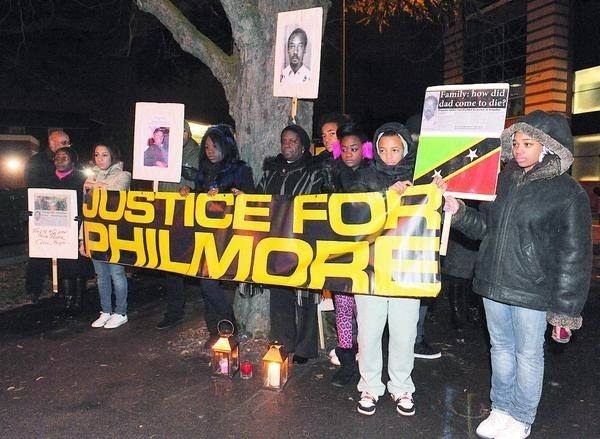
The family of a cancer patient who died after being restrained by police at the hospital where he was being treated have criticised the findings of an inquest for not sufficiently holding officers to account.
Philmore Mills was admitted to Wexham Park Hospital, in Buckinghamshire – now the Frimley Health NHS Foundation Trust – in December 2011 with a chest infection. Doctors later diagnosed him with pneumonia and lung cancer.
His family, who last saw him alive on Boxing Day that year, said he had been wearing an oxygen mask because of his breathing difficulties.
The 57-year-old father from Langley, Berkshire, died the following day after being restrained by police officers and hospital security staff when he became verbally aggressive towards nursing staff.
Despite three calls for help from the nurses, no doctors came to their assistance. Instead, two Thames Valley police officers and hospital security staff arrived.
Mills was handcuffed and held face-down on the floor with enough force to cause bruising to his shoulder, the inquest jury heard.

He became unresponsive and, when the cuffs were eventually removed, attempts to resuscitate him were unsuccessful.
An inquest at Reading coroner's court, which concluded on Tuesday, found "restraint and communication failures" contributed to the death. Senior coroner Peter Bedford recorded a narrative verdict, which means there is not one specific cause of death.
Mills' family are unsatisfied with the outcome and, despite hearing four weeks of evidence, said they were no closer to knowing why a "seriously ill" man was allowed to die in this way on a hospital ward.
"It is shocking that neither the nurses, security staff, or police officers spoke to each other before restraining him," his grandson Kyian Brown said in a statement.
"None of the witnesses accepted responsibility for [his] death. No family should have to go through what we have gone through."
Anjana Goswami, a senior nurse, told the court Mills had not been wearing his oxygen mask and he was standing up, holding his urine bag while having a go at staff, The Guardian reported.
She told the jury she was "frightened" by the scene, and had urged the police to remove the cuffs so Mills could be placed back in his bed and given oxygen.
"I could see he was sweating, he was struggling to breathe," Goswami said. "I told the police we need to put the patient first to bed; we can't let him lie down like this because he needs oxygen."
Mills died from cardiorespiratory collapse, hypoxia, and severe lung and heart disease in association with restraint, the inquest concluded on 8 March – more than four years after the incident took place.
Activist Saqib Deshmukh, who has been supporting Mills' family, told BuzzFeed News the family felt there was a lack of accountability for police officers' actions in the jury's findings, especially as the coroner concluded the death was restraint-related.
The family believes the police's intervention escalated a situation that should have been handled by medical professionals.
"The jury found fault with the medical staff and hospital security, but they didn't find as much issues with the police's conduct, despite the fact that it was the intervention of the police that caused his death," said Deshmukh, a member of the United Families & Friends Campaign.
"Police officers are trained in conflict management, but there was no attempt to engage with Philmore or calm him down."

Deshmukh questioned the amount of force used by police and why Mills, whom he described as a slight man weighing under 10 stone and no taller than 5 feet 7 inches, was perceived to be a threat.
"He had tubes coming out of his body and needed oxygen, so how he was deemed to be a threat is very concerning for us," he added.
Superintendent Simon Bowden said Thames Valley police will "fully review" the verdict and officers will receive the "best training" to enable them to deploy restraint tactics appropriately.
"Our thoughts remain with Philmore Mills' family and friends, and everyone who has felt the impact of this tragedy, at this difficult time," he added.
Deborah Coles, director of the charity Inquest, said that the way Mills was treated "raises serious concerns about the culture and practice in policing and health provision".
Coles also believes that deaths following restraint are not uncommon, particularly for ethnic minorities.
"There are a disproportionate number of deaths involving the restraint of men from black and ethnic minority communities," she said.
"The failures in this case, which have been exposed through the relentless attempts of the family to get to the truth, should prompt a thorough review, reflection, and reform in the way the police and health service respond to people in crisis."
The verdict came on the same day the Independent Police Complaints Commission revealed "troubling issues" in the way police use force, including restraint techniques, particularly on those who are vulnerable.
The report, released on 8 March, looked into the most serious incidences of use of force by police over a five-year period.
The findings showed the rate of fatalities increased when restraint equipment was used, or when police used force in a hospital.
Figures showed a disproportionate number of people with mental health concerns died or experienced multiple uses of force by police. Police were also more likely to use force on a young person of a black or minority ethnic background.
